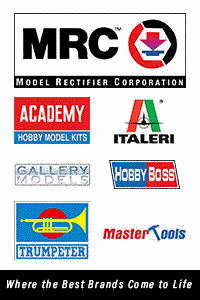
Hasegawa 1/72 F-106A Delta Dart Build Review
By Chuck Holte
| Date of Review | April 2017 | Manufacturer | Hasegawa |
|---|---|---|---|
| Subject | F-106A Delta Dart | Scale | 1/72 |
| Kit Number | 01054 | Primary Media | Styrene |
| Pros | Easy assembly, inexpensive | Cons | Heavy rivets, raised panel lines |
| Skill Level | Basic | MSRP (USD) | $15.99 |
Build Review
The F-106A Delta Dart was a developmental extension of the earlier F-102 Delta Dagger program with a larger, more powerful Pratt & Whitney J-75 engine, vice the F-102s P&W J-57, improved avionics and weapons capabilities. The "Six" was first flown in 1956, and became operational with the USAF Air Defense Command in June 1959 and soon became the service's primary manned interceptor aircraft. It flew in its primary mission as the "Ultimate Interceptor" into the late 1980s and continued in test and drone missions until the late "90s.
The "Six" modeled for this review was one of the early production aircraft assigned to the Air Force Flight Test Center at Edwards AFB CA. Aircraft #56-0467 was flown by USAF Major Joseph W. Rogers to a world single-engine speed record of 1525 mph in December 1959. My model attempts to represent that aircraft at the time it broke the world record, with many thanks to Caracal Decals for their stickers.

Construction of the venerable Hasegawa "Six" is straight forward and holds no big surprises. Although a little long of tooth, its accurate in dimension and shape is limited by heavy handed details such as boiler plate rivets heavy panel lines and cockpit. The one True Scale modelers have been building the Hasegawa kit for decades while waiting and hoping for a more advanced kit; such as the one recently provided by Meng. The Meng kit is very nice, a welcome update from the Hasegawa. But, with a number of Hasegawa kits in my stash, I wanted to show that with a little patience, and help from state-of-the art decals, the old girl can still be a decent model of the "Six," and at a fraction of the cost.
To represent Major Joe Rogers's record-setting steed, I used standard modeling techniques and procedures, filling and sanding joins, panel lines and rivets. The model was primed with Tamiya rattle can gray and finished with Model Master gloss Canadian Voodoo Gray, slightly darkened with gloss black. Test orange color was Testor's small square bottle Orange #1127 applied over a white primer. Proof of concept was the scheme and decals provided in the excellent Caracal Decals package
I found the Hasegawa kit easy to build and enjoyable as an old friend. The Caracal Decals were my inspiration and I'm quite happy with the resulting model on my shelf.
Recommended!











